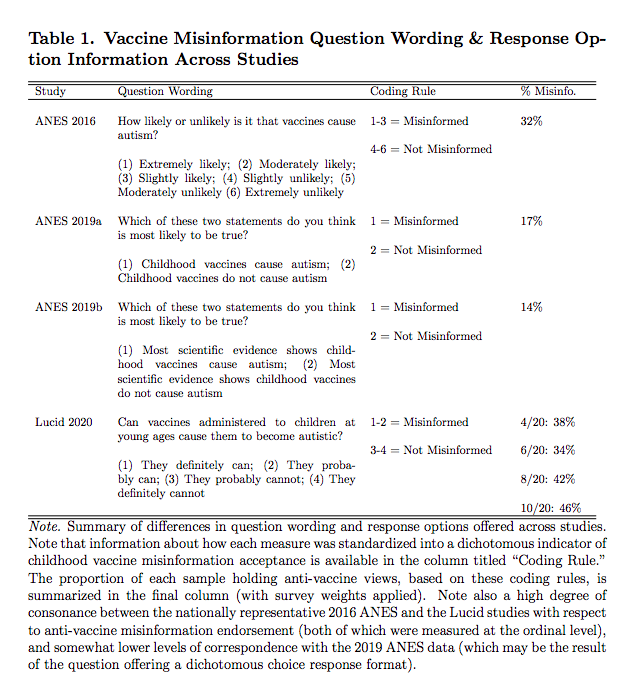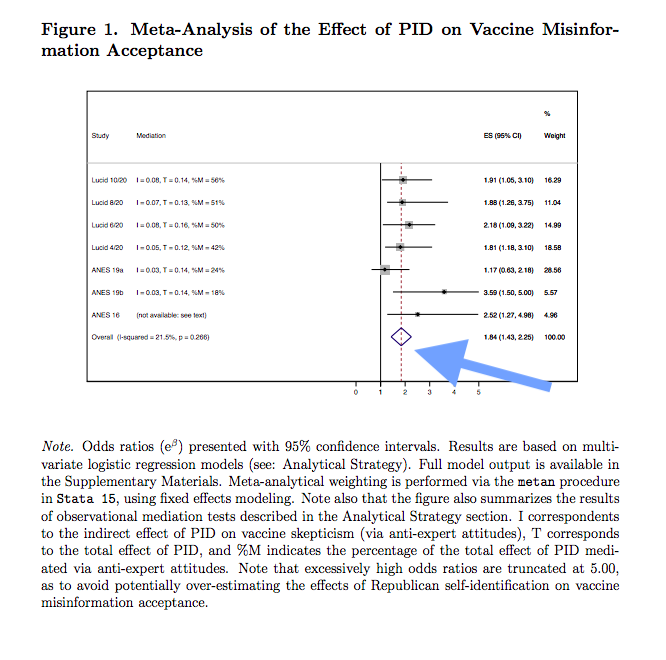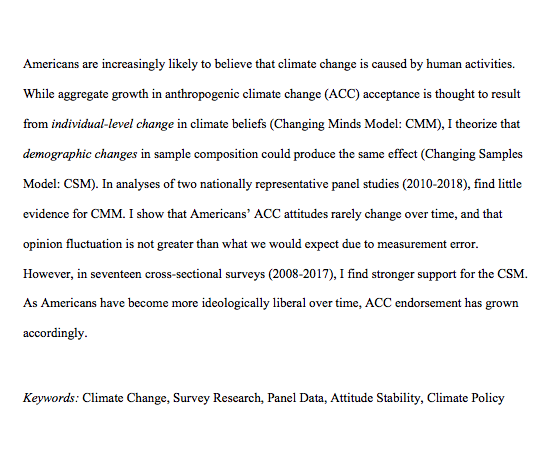
NEW at @apr_journal: I provide new evidence that Republicans (and not Democrats, as is sometimes assumed) are more likely to endorse anti-vax. misinfo.
This effect isn't new, and anti-expert attitudes may help explain why. #polisciresearch
journals.sagepub.com/eprint/C5CZCID…


This effect isn't new, and anti-expert attitudes may help explain why. #polisciresearch
journals.sagepub.com/eprint/C5CZCID…



First, some background.
Popular press efforts to document the prevalence of anti-vax. opinion often suggest (either tacitly or explicitly) that Democrats are more likely than Republicans to endorse anti-vaccine views.
Popular press efforts to document the prevalence of anti-vax. opinion often suggest (either tacitly or explicitly) that Democrats are more likely than Republicans to endorse anti-vaccine views.
Several, for example, suggest that "Whole Foods moms" [1] -- a grocery chain with a left-leaning reputation [2] -- end to be more likely to doubt childhood vaccine safety.
[1] inquirer.com/news/middle-cl…
[2] fivethirtyeight.com/features/senat…
[1] inquirer.com/news/middle-cl…
[2] fivethirtyeight.com/features/senat…
And anecdotally, at the outset of the #COVID19 pandemic, I had several covnos. with folks who were surprised to see that intended COVID vax uptake had become politicized.
Later on, several asked whether or not this effect was "new?"
Later on, several asked whether or not this effect was "new?"
The answer, as I argue in a new piece at APR, is "no." There is good reason to suspect that Republicans, not Democrats, should be more likely to endorse anti-vaccine views.
Among GOP elites, vaccine skepticism is not new. Former president Donald Trump, for example, frequently cast doubt on the safety of childhood vaccines in the lead-up to his first run for the White House in 2016. 

Additionally, as I and others have argued, attitudes toward the sci. community have been souring on the right for several years.
People who distrust scientists and medical experts [1] are, correspondingly, less likely to accept medical consensus about the safety of childhood vaccines. [2]
[1] journals.sagepub.com/doi/full/10.11…
[2] pubmed.ncbi.nlm.nih.gov/33414032/
[1] journals.sagepub.com/doi/full/10.11…
[2] pubmed.ncbi.nlm.nih.gov/33414032/
Across several demo. and ntlly. representative studies, I find consistent meta-analytic evidence that Republicans (not Dems.) are more likely to endorse misinfo about childhood vaccines.
Studies in the meta-analysis are summarized in the first image; analysis in the second.

Studies in the meta-analysis are summarized in the first image; analysis in the second.


I also provide evidence that these effects are mediated by anti-expert attitudes -- such that Republicans are more likely to hold anti-exp. attitudes, and are consequently more likely to then endorse anti-vaccine views. 

Interestingly, in a demographically. rep. svy of Americans, I find that just 28% of Americans think that Republicans are more likely than Democrats to hold anti-vaccine views. A plurality (47%) assume that there is no difference between partisans in vaccine misinfo. acceptance.
These results help us better understand the partisan dynamics of anti-vaccine beliefs, and underscore the importance of attempting to effectively communicate vaccine safety on the ideological right.
Failure to do so may allow partisan asymmetries to persist in the face of major public health crises; such as what we have seen with respect to vaccine uptake throughout the COVID-19 pandemic.
washingtonpost.com/politics/2020/…
washingtonpost.com/politics/2020/…
Thanks so much for reading!
• • •
Missing some Tweet in this thread? You can try to
force a refresh








